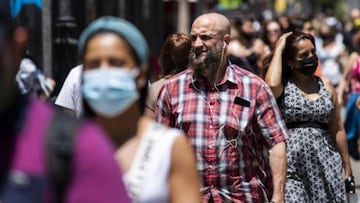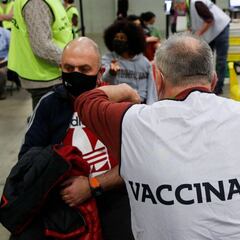A Japanese expert determines the most effective way to avoid Omicron infection
According to Makoto Tsubokura, a professor at the University of Kobe, maintaining distance is fundamental to avoid getting infected with Omicron.

One of the main characteristics of the Omicron variant is its high transmissibility. That ability to jump from one host to another has caused a surge of infections around the globe since it was first detected in November.
Vaccination with a third dose has proven effective at preventing serious illness, hospitalizations and deaths as a result of infection by the most recent variant of SARS-CoV-2 also known as covid-19. A study performed by UK health authorities found that a booster dose of a covid-19 vaccine provided 90 percent protection two weeks after being administered, a conclusion similar to that of various other studies. However, researchers in Japan have determined the most effective way to avoid catching covid-19.
Also see:
- Is covid-19 considered a natural disaster for taxes?
- Reports of booster side effects are over-estimated
- Covid Omicron or allergy? How to tell the difference
- Viral fragment of unreported covid-19 variant found in New York City
People need to go back to the basics to avoid Omicron
A group of researchers at the University of Kobe carried out an investigation reported in 'Asahi' which showed that maintaining social distancing was key to avoiding infection with the Omicron variant. The leader of the team and professor at Kobe University, Makoto Tsubokura, said “It is important to go back to the basics and to make sure that people take measures against infection, such as keeping a distance from people.”
On the other hand, Tsukobura emphasized the need to strengthen other established measures to stem the spread of the virus such as washing hands and using a face mask. “In order to reduce the risk of infection to the level of that of the original novel coronavirus, we need more measures,” the professor said.
Supercomputer underscores need for ‘distance’ to fight #Omicron | The Asahi Shimbun: Breaking News, #Japan News and Analysis : The Asahi Shimbun https://t.co/jZVXhHh3PW
— Asahi Shimbun AJW (@AJWasahi) February 3, 2022
Omicron is 1.5 times more transmissible than Delta
After looking at the results of epidemiological research and other sources the team estimated that Omicron is 1.5 times more transmissible compared to Delta. In one scenario they looked at two people having a 15-minute conversation spaced one meter, about three feet, apart. The chance of a person not wearing a mask infecting the other with Omicron was about 60 percent and could go over 90 percent at most.
However, increasing the distance to two meters between the two individuals produced much lower probability of infection. The chance fell to 20 percent on average and 60 percent at most. If the infected person wore a mask and was at least a meter from the other individual the chance of spreading the virus dropped to almost zero.
Omicron doesn’t discriminate – we are all at risk of #COVID19. Protect yourself, others & your community by:
— World Health Organization (WHO) (@WHO) February 7, 2022
Getting vaccinated
Keeping a safe distance & avoiding crowds
Wearing a well-fitted mask
Keeping indoor spaces ventilated
Cleaning hands
Covering coughs & sneezes pic.twitter.com/vMauO4LOW9
The end of the covid-19 pandemic gets closer
Epidemiologists and virologists on more than one occasion have predicted that the coronavirus pandemic would come to an end sometime in 2022. They foresee covid-19 becoming an endemic disease. The European regional director of the World Health Organization Hans Kluge said “the region is moving towards a kind of pandemic endgame.” He told AFP in his view that “either thanks to the vaccine or because people have immunity due to the infection,” there will be global immunity.
Related stories
Countries like Spain where nearly 82 percent of the population is vaccinated could have an advantage over its European counterparts in the face of any new surge in infections according to Christian Drosten, a German virologist, given that it has a smaller pool of unvaccinated individuals.
In Europe, Denmark was the first country to declare an end to the pandemic based on the nation’s high vaccination rate and less severe illness caused by the Omicron variant. This has led to the relaxing of all restrictions imposed on the hospitality sector, including nightclubs. Additionally, mask mandates will be rescinded which are being dropped in other European countries like the UK, France and soon Spain.

